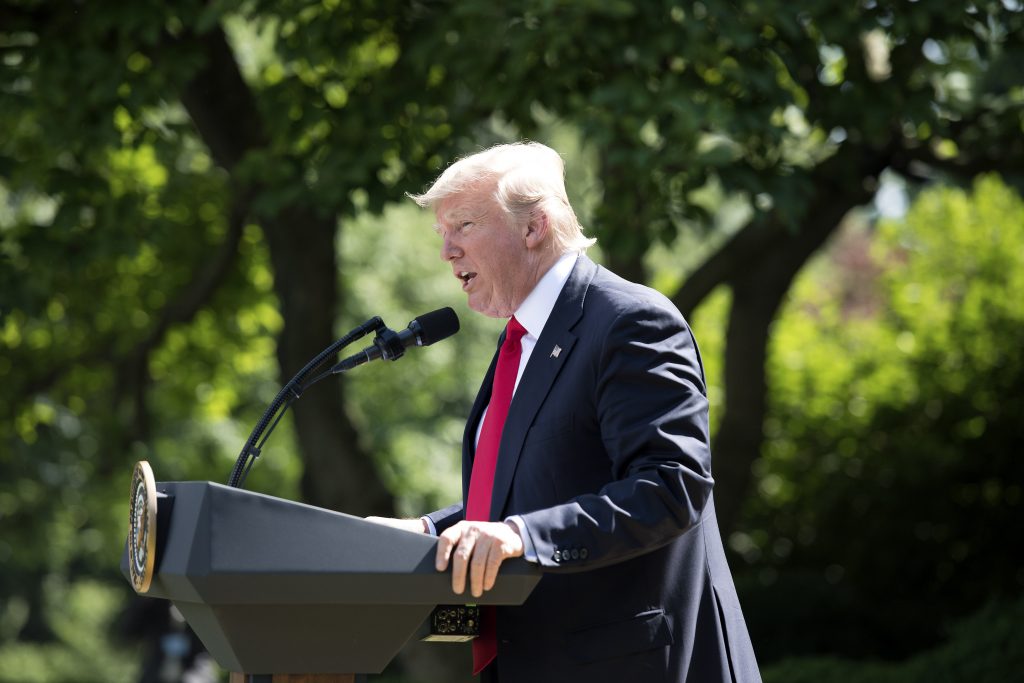So, America’s out of the Paris deal.
The climate change world isn’t happy, and neither are a lot of global leaders, from French President Macron, who said we need to “make the planet great again”, to Elon Musk, who said this wasn’t good for America or the world, and resigned from Trump’s advisory council.
What was this agreement again?
Quick recap: The Paris Agreement was basically a deal between 187 countries around the world to slow down the overheating of the planet. Some of the main ideas were to stop using so many greenhouse gases, have richer countries give poorer countries money to help them switch to renewable energy, and do everything possible to prevent the earth’s temperature rising more than 2 degrees.
Why is Trump so anti?
Trump wasn’t a fan. “The Paris accord would undermine our economy, hamstring our workers… and put us at a permanent disadvantage to the other countries of the world,” he said.
He’s particularly unhappy with the provision for rich countries to help poorer countries make their energy systems more sustainable. With the country already in so much debt, he claims it’s not fair for America to put even more towards countries who haven’t contributed their fair share. He said he was elected to support the citizens of Pittsburgh, not the people of Paris.
(Awkward fact: Pittsburgh supported Hillary Clinton. Bill Peduto, the mayor of the city, issued a statement this morning saying the city supports the agreement and condemns Trump’s decision. And 70 per cent of Americans across the country feel the same way.)
People’s reactions basically boil down to three types: Excitement, if you’re a hardcore Republican or run a coal mine; Despair, if you’re a Democrat or believe that climate change is a serious threat to the world; or just a shoulder shrug, if you don’t care that much about it or think the Paris Agreement wasn’t the best idea in the first place.
Hardcore Republicans are psyched
If you don’t believe in climate change, or you have a stake in a business that relies on fossil fuels, this is good news. Switching from fossil fuels to renewables and reducing greenhouse gas emissions would lead to a short-term loss in jobs for people in oil, gas, and coil industries, by reducing demand and government support for their product.
Because fuel is such an essential part of keeping the rest of the economy running, energy companies often get ‘subsidies’ or grants from the government to help them keep going – the fossil fuel producing ones would lose those if renewables became the new thing, so they’ll be pretty glad the pressure is off. (Then again, they also make more profit than pretty much all other companies, so even if they don’t get government help, they’d probably still be okay.)
Democrats are much less psyched
If you’re a Democrat, or someone who does believe in climate change and is worried about what it means for the world, this is pretty awful news.
The world’s most powerful and influential economic organisations have said that climate change is the biggest threat to our economies because of increased risk of natural disasters like floods, droughts, and storms, and because of the danger it poses to the resources we need to survive.
After China, the US emits more carbon than any other country in the world. And because the climate doesn’t really respect national borders, the way they treat their environment affects countries across the globe as well as their own citizens – which is why so many global leaders have come out and said they think this is a really, really, really bad idea.
Climate experts are kind of chill about the whole thing
Okay, ‘kind of chill’ might be an exaggeration – this is obviously not great news if you have literally dedicated your life to tackling climate change – but a lot of people who work on this issue have actually said this isn’t as big a disaster as some might think.
Firstly, the US can’t withdraw within a day. It takes 4 years to do – which, funnily enough, would take us right to the next election, which might be won by someone who decides to stay in after all.
So aside from stopping the money being sent to the UN Green Climate Fund, a lot of which had been cut already anyway, Trump can’t actually do anything drastic until the end of his first term, by which time he might not even be president anymore.
Secondly, not everyone was such a huge fan of the Paris Agreement in the first place. They said it was too soft to really tackle the urgency of climate change, and didn’t include provisions on some of the most polluting parts of our economies like shipping or aviation. A lot of what it stands for is non-binding, using words like ‘try’ and ‘aim to’ rather than ‘must’ – which gives countries a lot of leeway to be like, “Oops, didn’t manage,” rather than forcing them to restructure their economies.
What now?
Trump says this doesn’t mean America isn’t going to be environmentally friendly. “We’ll be the cleanest,” he said in his speech yesterday. “We’re going to have the cleanest air, the cleanest water...but we’re not going to put our businesses out of work and we’re not going to lose our jobs.”
If he really means it, he’ll have support to make that pledge happen. 1,100 businesses across the US, from Facebook to Mars to Unilever, have signed a letter saying they support Paris. So have over 80 mayors of cities across the country. And let’s not forget the other 186 countries that are signed up and committed to the agreement.
In sum, it looks like all is not lost for those who agree that climate change is pretty high up on the list of economic concerns for the world.




